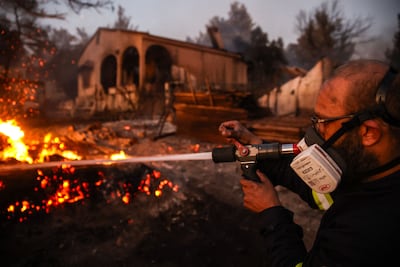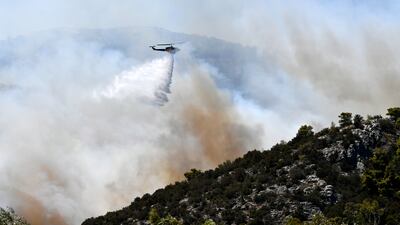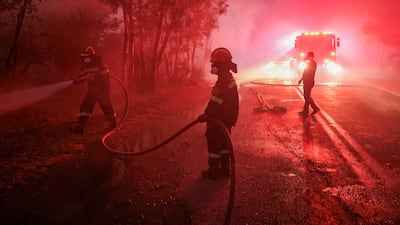One person has died in Greece during the country’s worst wildfire of the year, which continued to burn on the outskirts of Athens on Tuesday.
Fuelled by strong winds, the wildfire raced across parched landscape north of the capital, wreaking widespread destruction with dozens of houses, cars and businesses turned into charred shells.
The blaze broke out on Sunday near the village of Varnavas, 35km north of the capital, destroying homes, vehicles and parts of bone-dry forest.
It continued to spread, stoked by gale-force winds, growing to a 30km front line of flames more than 25 metres high in places. It reached Vrilissia, about 14km from central Athens, a day ago, where woman believed to be about 60 years old was found dead, the fire brigade said.

State news agency ANA reported that the woman’s body was recovered on Tuesday from inside a burnt-out Athens factory building in Patima Chalandriou, part of a municipality of more than 70,000 people that was partly evacuated on Monday.
At least one firefighter suffered serious burns battling the blaze, while another was admitted to hospital with breathing issues, fire brigade spokesman Vassilis Vathrakogiannis said on Monday.
According to the Health Ministry, 66 people have been treated for injuries related to the fire since Sunday. The cause of the wildfire has not yet been determined.

Hundreds of firefighters backed by fire engines and waterbombing aircraft, reducing the intensity of the blaze, which choked the capital with smoke and ash, stirring panic in neighbourhoods that had not seen such a fire so close to the centre in decades.
Col Vathrakogiannis said firefighters were longer battling a single front but “many active localised blazes”, mostly around Marathon and Pendeli.
The Marathon area was the site of a famous battle between Greeks and Persians in 490BC and hosts a museum and archaeological site, but there were no immediate reports of fire damage to either.

Winds were expected to pick up again later on Tuesday and the country will remain on high fire alert until Thursday, with strong winds and temperatures forecast to reach up to 40°C.
“The overall picture looks improved but there are still many fronts in various areas,” said a fire brigade official.
More than 30 areas have been forced to evacuate, along with at least three hospitals, with power cuts in parts of the wider Athens region. Passenger ferries heading to the port of Rafina, north-east of the capital, were diverted.
Police have helped evacuate more than 250 people, and some residents spent the night in shelters.

The flames have left abandoned homes, burnt cars and charred fields in their wake. Local newspaper Proto Thema said the damage spanned 100 square kilometres and included 100 homes.
Reinforcements from several EU states as well as Serbia and Turkey are expected on Tuesday, after Athens sought international assistance, activating Europe’s mutual civil protection mechanism.
Greece is also expecting help from France, Italy and the Czech Republic with aircraft and firefighters.

Meteorologists had warned of the increased danger of wildfires because of weather conditions from Sunday until Thursday.
Wildfires have been a common feature of Greek summers for years, but climate change has brought hotter weather and less rain – ideal conditions for large-scale fires.
The southern European country experienced its warmest winter on record this year and was on track for its hottest summer, with scant rain in many areas for months.
The worsening situation was mirrored across southern Europe, including in Spain and the Balkans.
In 2018, a massive fire swept through the seaside town of Mati, east of Athens, trapping people in their homes and on the roads as they tried to flee in their cars.
More than 100 people died, including some who drowned trying to swim away from the flames.
Last year, wildfires in Greece killed more than 20 people, including 18 migrants who became trapped by the flames as they trekked through a forest in north-eastern Greece and were caught by a massive blaze that burnt for more than two weeks.
Wildfires on Monday also hit neighbouring North Macedonia and Albania, which have had high summer temperatures and strong winds.














